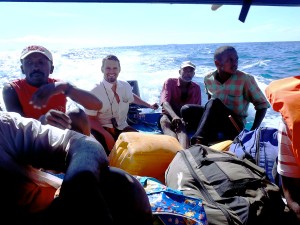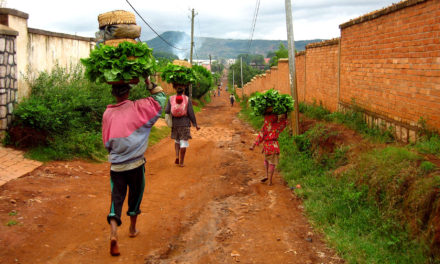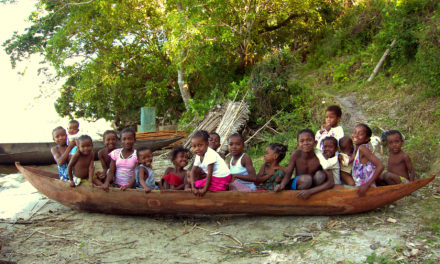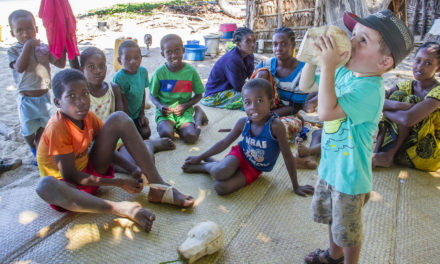Y ou could hear them even before they got close: a handful of ladies making their way down the beach singing energetically. I ran to meet up with them as we continued on to the next village where more joined us. As we began the hour and a half trek to a village in the central part of the island, one lady exclaimed happily, “We’re going with the foreigner!” To which her friend responded, “No, a foreigner doesn’t do things like this with us. She’s one of us now!”
I smiled. It was the first time I was able to join the ladies’ organization and be a part of their events. Normally they gather to learn songs and dances, but this day was just a day of fun. I knew there would be dancing and I was excited to see what some of their traditional dance was like. As the women from all over the island arrived, the party commenced with a gas-powered generator playing loud thumping music. Nearly a hundred women crowded around and began their traditional dance that I had come to see… twerking! (For those who don’t know, this is what Americans call a type of dance where you shake your bottom around rapidly and violently). And twerk they did, for hours upon hours. Even the very small children were quite adept at this style of dance!
I honestly wasn’t able to talk to many people that day because the music droned everything out, but word spread quickly that I was there and everyone everywhere on Nosy Mitsio was asking me about it the next day. It’s been months now since I attended this event, and every time we visit someone they still talk about how I’m part of the women’s group. I haven’t done much but be there, but that seems to mean a lot to them.
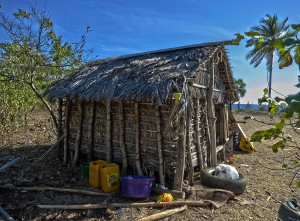
The storage hut that we moved into (our “temporary home”) when we first arrived on Nosy Mitsio in August 2013.
I t’s been almost a year since we moved onto Nosy Mitsio into our dilapidated little temporary hut. Nobody knew what to think of us. Never in their history had they experienced white people staying with them. We told them we’re here because we want to know them and learn from them, but it must’ve sounded nutty. Nobody believed us and we constantly got questions about whether we were building a restaurant or a hotel. (Though there are no restaurants on Nosy Mitsio and only a couple broken-down tourist bungalows.) Many people wouldn’t greet us. Some were too scared to talk to us and others would approach us only to ask for handouts. The separation between us and them was intangible, but it was clearly there.
We’ve experienced firsthand and have also learned from other Malagasy that the Antakarana are not a very welcoming people and they’re slow to trust outsiders, even Malagasy from other tribes. Although they freely share with each other and engage in conversation, they also keep quite separate from one another as each village is usually made up of just one extended family.
But despite the lack of welcome and hospitality, totally unlike what we’ve experienced in other parts of Madagascar, we’ve continued to be a part of life on Nosy Mitsio. And I’ve struggled with what that looks like because lately I’ve become restless, thinking that I need to be doing something more for God’s kingdom.
M ost of the last year has been spent building our home and our team members’ homes and preparing for their arrival. Now that the preparation is mostly finished, the last few months have been a time of just “being” here and soaking in day-to-day life as we share it with our neighbors. If you’ve kept up with our stories you know that we’ve spent many uncomfortable hours together on boat rides trying to make it to and from the mainland. We’ve attended our neighbors’ ancestral events. We stood in horror together as another foreigner attempted to buy their children. And together we’ve experienced the everyday challenges of mice and itchy plants.
Yet despite the challenges, we’re still here just doing life. I realize now that people here never believed we would really stick around because they often say with pleasant surprise, “You must really enjoy it here because you’re staying a long time!” After a year of being on Nosy Mitsio, there’s been a huge change in how people respond and relate to us. They get excited when we attend their events and learn more of their dialect. They are eager to help us with any questions we have and are patient when we don’t understand. People smile more when they see us and welcome us to come sit and chat with them. Visitors stop by our house and sometimes bring us gifts. That’s a huge difference from the way they treated us as strange aliens not long ago.
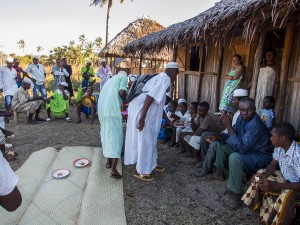
End of Ramadan celebration. A large group of men and boys paraded through the villages and they stopped by our house to receive hospitality.
But all of this didn’t happen overnight. It has required time: time to show the people that we really are sticking around and that we’re here to know them and to be a part of their lives. No amount of words would’ve ever convinced them. There has been no precedence. They had to see it. They’ve been watching and taking note of everything, from our openness with them to our inevitable blunders in culture and language. And it’s in this “being” with them that things have begun to change. We’re no longer the strange aliens. As my friend observed, we’re one of them now.
I t’s been said that there are those who plant the seeds, those who water, and those who harvest. But we often forget what needs to be done first: clearing the land and preparing the soil. We must break the ground and till the soil. Even before the foundation of a house can be laid and the main posts erected, someone has to chop down any trees in the area and pull out the stumps, to tear out the roots of weeds and remove the rocks. It’s become clear to me that this year has been an important time of preparation: for softening the ground and gaining trust with the people through being, enduring, and participating in life with them.
And this stage is tough because you don’t see the harvest of what you’re planting, not even the sprout of a little seedling. You can’t see the finished home, not even the foundation… yet! Paul talks in 1 Corinthians 13:12 about how in this life we won’t see it all clearly, just bits and pieces. And what we’re left with is faith, hope, and love. “Faith is the assurance of things you have hoped for, the absolute conviction that there are realities you’ve never seen” (Hebrews 11:1). It means we anticipate and expect the field to be full of crops and the house to be completely finished, even if we don’t yet see it. Just as God began his redemptive work thousands of years before he brought it to completion in Jesus, we must continue our work in hope and anticipation of His kingdom breaking through the hard ground, bringing life and making all things new.
N.T. Wright expresses it well: “The point is this: the full reality is yet to be revealed, but we can genuinely partake in that final reality in advance. We can draw down some of God’s future into our own present moment.” May we all live out our daily lives with family, friends, neighbors, and co-workers in expectation of God’s completed work, reflecting his glory into the world.
In Christ,
Lora, Adam and Matimu Willard


